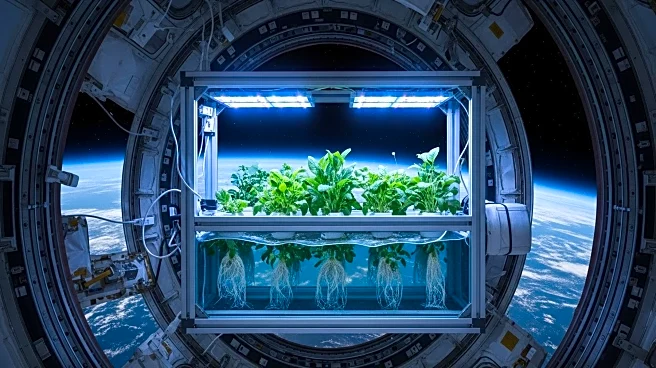What's Happening?
NASA has partnered with AeroFarms to conduct a vertical farming experiment aboard the International Space Station (ISS). This initiative aims to grow leafy greens under microgravity conditions, with early results indicating successful growth cycles and nutrient retention comparable to crops grown on Earth. The experiment is part of a broader effort to develop sustainable food production systems for long-duration space missions and potential extraterrestrial colonization. Other companies, such as SpaceX and Orbital Farm Technologies, are also involved in testing automated hydroponic systems and compact modular plant growth units for space missions. These systems are designed to optimize water and nutrient delivery in zero gravity, improving crop yields and reducing resource consumption.
Why It's Important?
The development of space agriculture is crucial for ensuring food security and supporting human survival during long-term space missions. As interest in human space exploration grows, including missions to the Moon and Mars, the need for reliable food production systems becomes increasingly important. Space agriculture technologies, such as hydroponics and aeroponics, offer solutions for growing crops in controlled environments, enhancing crop yield, resilience, and nutritional quality. Collaborative efforts between aerospace agencies, universities, and private startups are accelerating innovation in this field, potentially leading to sustainable living conditions in space.
What's Next?
Future developments in space agriculture will likely focus on enhancing automation, AI-based monitoring, and environmental control systems to improve efficiency and resource utilization. Emerging partnerships between space agencies and commercial spaceflight companies are expected to expand experimental opportunities and infrastructure. Continued research on plant growth under microgravity and limited resources will provide critical insights for future long-term missions. The integration of advanced bioregenerative systems and closed-loop life support systems will be pivotal in ensuring sustainable extraterrestrial living.
Beyond the Headlines
Space agriculture not only addresses food security for space missions but also contributes to advancements in plant genetics and nutrient delivery systems. These innovations have the potential to impact terrestrial agriculture by improving crop resilience and nutritional quality. The ethical and environmental implications of space agriculture, such as resource allocation and sustainability, will continue to be explored as the field develops.









